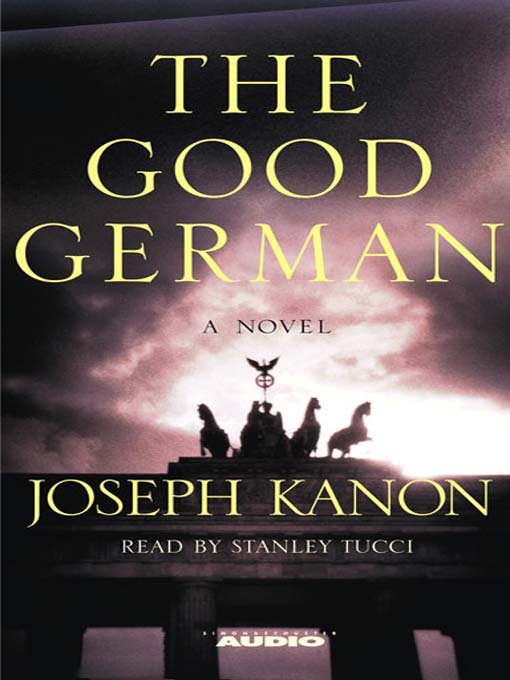
The Good German
کتاب های مرتبط
- اطلاعات
- نقد و بررسی
- دیدگاه کاربران
نقد و بررسی

Stanley Tucci impersonates each character so convincingly that I checked the liner notes twice; I couldn't believe this was just one reader. He's a pompous American Congressmen: "Got a name, son?" He's a German policeman: "And zee Americahns are zo much bitta?" He's even a righteous fraulein in occupied Berlin: "I vas neva a Nazi! Neva!" The trouble here is that Kanon doesn't waste words, and his 482-page book, which would take at least 12 hours to record in its entirety, has been cut to 7. So the story, while comprehensible, is more map than countryside. B.H.C. (c) AudioFile 2002, Portland, Maine

July 16, 2001
Again taking one of the 20th century's most momentous periods as a backdrop, Kanon recreates Berlin in the months following WWII in this lavishly atmospheric thriller overburdened with political and romantic intrigue. Though driven by strong characters and rich historical detail, the book ultimately falters under the weight of a ponderous, edgeless plot. At the center of the drama is Jake Geismar, a journalist who arrives in Berlin ostensibly to cover the Potsdam Conference. In reality, he's consumed with finding his prewar lover, Lena, with whom he carried on a torrid affair unbeknownst to her husband. Before he finds her, however, Geismar becomes intrigued by the murder of an American soldier whose body washes ashore near the conference grounds. The military's reluctance to investigate or provide any details of the murder convinces Geismar that this could be his big story. Though he's warned not to meddle, Geismar can't resist the story's draw. His investigation leads him deeply into Berlin's agonizing struggle for survival—its black market, its collective guilt and its citizens' feeble attempts to wash themselves clean of wartime atrocities. And, most importantly, Geismar learns of the Allies' frantic attempts to round up Nazi scientists, including Lena's husband, Emil, whose expertise with missiles made Germany such a fierce enemy. Kanon (Los Alamos; The Prodigal Spy) is at his strongest when giving voice to the hard choices and moral dilemmas of the times, yet he labors at bringing his plot to a close and blurs its core in the process. While his descriptive skills have never been sharper—the writing is uniformly elegant—Kanon's third thriller since leaving his job as a publising executive digs in when it should be attacking. BOMC featured selection; $150,000 marketing campaign; movie rights optioned by Warner Bros.; 12-city author tour.

At the very beginning of Kanon's novel, Michael Kramer makes an unfortunate choice that will plague his entire performance. It is not a mistake of skill so much as proportion. The novel, based in post-war Germany, concerns the morally ambiguous competition between the United States and the Soviet Union--emerging Cold War foes--for the brain-power of the German scientists who, until recently, served the Third Reich. From the start, Kramer elects a delivery rooted in noir sensibilities, one well-suited to a Raymond Chandler novel but somewhat off the mark here. By investing such disdain and cynicism in say, the machinations of an American congressman trying to wring political benefits from the tragedy of the war, Kramer leaves himself little room when Kanon turns to crimes of truly monstrous dimensions, namely the Holocaust itself. He oversells early, which limits him the rest of the way. M.O. (c) AudioFile 2002, Portland, Maine

























دیدگاه کاربران